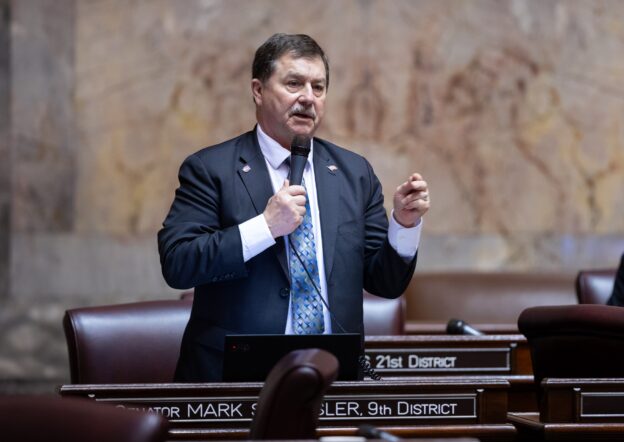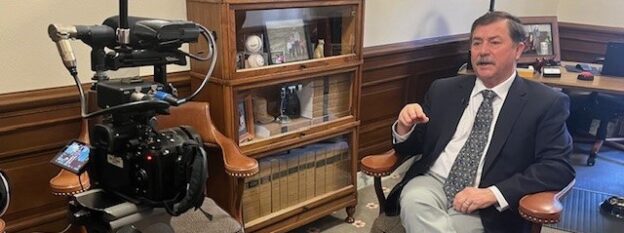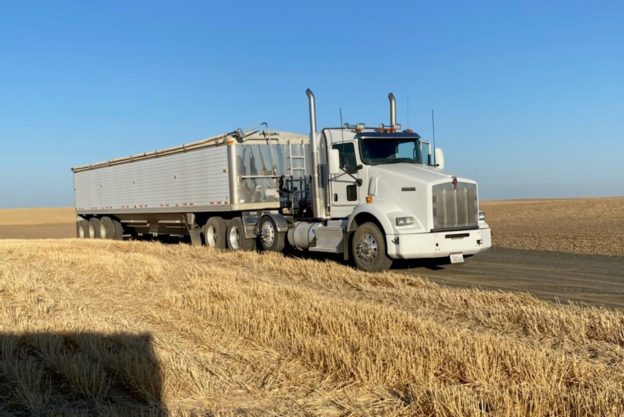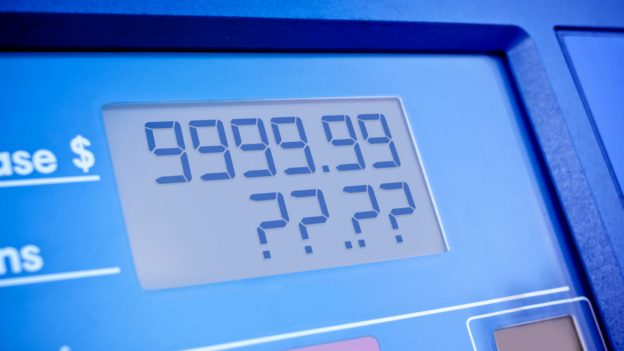Tag Archives: Climate Commitment Act
OLYMPIA… The two state senators who farm in eastern Washington say they’re not sure what to make of a proposed offer of money for farm-fuel users who got stuck paying a surcharge on their fuel purchases because of the state’s cap-and-trade law.
The payments, which could amount to no more than pennies per gallon for many farming operations, are offered in the state Senate’s supplemental operating-budget proposal.
“I don’t know anyone in the agricultural sector who would view this as a solution to the fuel-surcharge issue we’ve been fighting more than a year, since cap-and-trade was fully implemented,” said Sen. Perry Dozier, R-Waitsburg.
“These payments wouldn’t come close to making up for what farm-fuel users have been forced to pay because the executive branch of state government failed to uphold the promise made in the cap-and-trade law – that farm diesel and fuel used by the maritime industry would be exempt from the surcharge this new program would create,” said Sen. Mark Schoesler, R-Ritzville.
Schoesler serves on the Senate Ways and Means Committee, which held a public hearing yesterday on the proposed supplemental operating budget. The budget appropriation doesn’t refer to the payments as rebates or reimbursements, and routes them through the state Department of Licensing – not the Department of Ecology, which is responsible for implementing the cap-and-trade law.
“Are these payments a way for the state to ease its guilty conscience for failing so badly on upholding the promised fuel-surcharge exemption? Does the timing have anything to do with the certification of the initiative to repeal the cap-and-trade law? Are the supporters of cap-and-trade just looking to throw a bone to agriculture? No one who buys farm fuel by the truckload would come up with this,” said Dozier.
Dozier and Schoesler are the sponsors of Senate Bill 5728, introduced in 2023. It would basically force Ecology to develop a process for implementing the promised exemptions. The bill has been ignored, and a task force set up by Ecology during the summer failed to completely resolve industry concerns.
Given that background, the senators were surprised to see a $30 million appropriation, buried on page 564 of the new Senate budget proposal, “solely for payments to support farm fuel users and transporters who have purchased fuel for agricultural purposes that is exempt from the requirements of the Climate Commitment Act… but paid a surcharge or an additional fee.”
The payments would be made by the Department of Licensing to “noncorporate farms” first – a term not defined in the budget bill – depending on annual farm-fuel consumption. The first tier, those using less than 1,000 gallons annually, would receive $600; the second tier, between 1,000 and 4,000 gallons consumed, would get $2,300; and those using 4,000 gallons or more a year would receive $3,400.
“It’s a lame proposal because most farms of any size operate as a corporation,” said Schoesler. “On top of that these tiers make no sense, except they’re consistent with the whole premise of cap-and-trade – or ‘cap-and-tax,’ as it should really be called. This law is about punishing people who use fossil fuel. It’s as though they think there are electric combines down at the farm-equipment dealer.”
Dozier agrees the tiered approach is not realistic. “One tractor pulling a heavy load can go through 25 gallons of fuel an hour. At that rate just one week of 10-hour workdays will blow past the 1,000-gallon threshold.
“It’s not difficult for a farm to go through 30,000 gallons of diesel in a year. Under this proposal, that’s 11 cents per gallon. Adding more tiers based on 10,000-gallon increments would be a slight improvement, but if the intent is to honestly compensate users who have been paying the surcharge, the payments to them should really be gallon for gallon, with no tiers at all.”
The Senate budget proposal also includes $35 million to provide low-income households with energy utility bill assistance. Like the payments proposed for farm-fuel users, those subsidies would be funded with proceeds from the cap-and-trade law, which has enabled state government to rake in about $1.8 billion in the past year from auctioning “carbon allowances.”
“In December the governor proposed using cap-and-trade money to subsidize low-income households. It wasn’t a surprise to also see it in the Senate budget. But this money to pay farm-fuel users feels like something thrown in at the last minute by people who don’t understand agriculture,” said Schoesler.
“This is a pretty responsible budget proposal overall, and I appreciate that Republicans had a fair amount of input about the priorities,” said Dozier, “but it needs some work to be a budget that truly respects the needs of agriculture.”
The recent carbon allowance auction held by the state Department of Ecology under the state’s costly cap-and-trade program will mean even higher fuel prices for drivers in Washington just as the summer driving season is about to start, says 9th District Sen. Mark Schoesler.
“Drivers across Washington will pay even more at the pump thanks to the cap-and-trade program,” said Schoesler, R-Ritzville. “Fuel prices typically rise when summer driving season arrives, and this latest auction by DOE will cause trips to the gas station to be even more expensive for both drivers here and those from other states who want to see Washington.”
Today’s release of the results from DOE’s May 31 auction showed that the price for a Washington carbon allowance was $56.01, up from $48.50 in the February auction. It is estimated that the new allowance price will translate to an additional charge of 45 cents a gallon at the pump. This is slightly higher than the estimated 39-cents-per-gallon impact from February’s auction by DOE.
A rough estimate for revenue raised in last week’s auction is about $480.8 million for current vintage allowances and about $76.2 million for future vintage allowances. The February auction collected nearly $300 million.
Schoesler said Gov. Inslee’s expensive cap-and-trade program, known as the Climate Commitment Act and approved by Democrat majorities in the Legislature in 2021, is taking hundreds of millions of dollars out of drivers’ wallets and handing it over to state agencies for various spending programs, all in the name of climate change.
“The latest carbon auction by DOE is just another example of the Democrats’ spending spree in Olympia that will affect people throughout Washington. Starting July 1, most workers across our state will also have to start paying an expensive payroll tax to fund a very flawed long-term care program.
“It’s shocking how Democrats actually seem to be proud about taking so much money away from citizens. Olympia needs to stop squeezing even more money out of hard-working taxpayers and instead start respecting them,” added Schoesler.
The report from Ecology’s May 31 auction can be viewed here.
When the Climate Commitment Act was passed by majority Democrats in 2021, creating a “cap-and-tax” program for greenhouse gas emissions that is expected to significantly raise fuel prices, the measure included an exemption for farmers and other groups from paying the surcharge created by the program.
But since the law was implemented by the state Department of Ecology on Jan. 1 of this year, the expected exemption for farm diesel and fuel used by the maritime industry has not taken effect, angering farmers and others who expect to benefit from it.
A pair of eastern Washington Republican senators is sponsoring a bill that aims to fix the problem.
Senate Bill 5728 would develop a process to implement exemptions for farm diesel and other certain fuels under the “cap-and-tax” program. It has been sent to the Senate Environment, Energy and Technology Committee. No public hearing has been scheduled.
“When the Climate Commitment Act was being drafted, we were told famers would receive an exemption and not pay higher fuel taxes. That did not happen,” said the bill’s prime sponsor, 16th District Sen. Perry Dozier, R-Waitsburg. “The Department of Ecology should be responsible for finding a solution to ensure that farmers and the maritime industry are not burdened with the higher fuel costs as a result of the cap-and-tax legislation.”
“After I learned that the farm-fuel exemption had not been implemented, I asked the Department of Ecology why,” said 9th District Sen. Mark Schoesler, R-Ritzville. “DOE officials have blamed “Big Oil” for the lack of an exemption so far. They also say this exemption will be extended this summer, apparently forgetting that farm work goes on well before summer. The exemption on fuel for the agriculture and maritime industries needs to take effect now, not months from now.”
Under the proposal, DOE and the Department of Revenue must create a method to determine the additional amount paid by an end user of exempt fuel, such as a farmer, due to a fuel supplier’s compliance obligation. Compensation to an end user must be paid no later than 14 days after DOE receives an application for reimbursement.
















